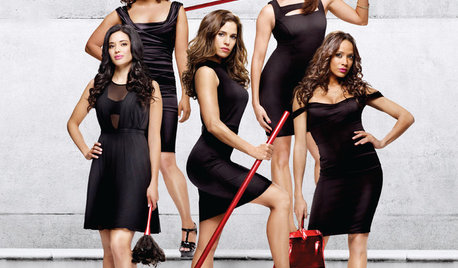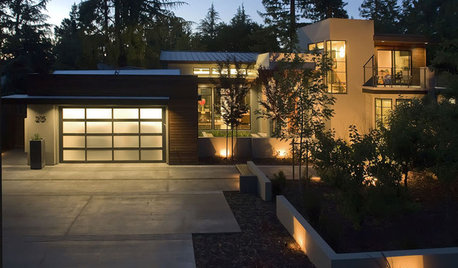minimum wage
How is it working for you? DD #2 came home from college for the long weekend. She was telling me how her campus has changed since the new minimum wage laws went into effect. First--the job she was trying for dried up, the dorm desk is rarely manned, they now walk across campus to get mail, the food services "restaurants" are not open all at the same time, and rarely on weekends. No one can afford to pay their workers. Next year they will have doubled their prices and tuition to cover it. Inflation at its best!!
Comments (107)
MtnRdRedux
9 years agoCyn,
I thought of excising the caption so as not to misdirect ... It surely is part of the key to the current problem. But the buildings have been around for decades through economic vicissitudes. Kind of a sidebar comment ... But it sure looks as though they were trying to create a very positive physical environment and it failed. So many unintended consequences, as in the example the school secretary gives above.
cyn427 (z. 7, N. VA)
9 years agoMtn,
Even without the caption, the bottom line is that economic disadvantages (lack of jobs which provide wages that one can live on) drives so much of what happens to people. It wasn't that the physical environment failed, but that over time, the social fabric of the area broke down in response to factors including, but not limited to, povery, discrimination, and exclusion by the society at large. One might like to call it unintended consequences, but IMO, it is more a lack of acceptance and positive actions on the part of those who watched people in free fall and didn't help.
Related Discussions
Preaching to the choir.
Q
Comments (5)Nothing I didn't know....but for the actual numbers. Someone needs to show people how to make hamburger helper from scratch. I remember back when Sloppy Joe's were the hamburger helper of the day, people were amazed that I could make a sloppy Joe without canned soup! Or a chuck roast without a package of dry onion soup mix, or a chocolate cream pie without a premade graham cracker crust in a disposable tin and a box of pudding mix....oh yes and an envelope of "whipped topping". The pie takes longer but costs lots less....the rest is quick and easy. I took a shortcut through the "frozen entrees" section of the supermarket earlier this week...oh my...and there is another section for breakfast. Not long ago that contained mainly frozen juice, frozen fruit and Eggos. Now there's a whole section with sandwiches and who knows what else. I used to think I was a slacker if I made Bis Quick pancakes and bought sausage links rather than thawing some ground pork and seasoning it, now you can buy precooked bacon and precooked eggs!...See MoreWhat is your minimum wage?
Q
Comments (22)When I worked as a security guard, most of us got minimum, or maybe 10 cents above. Few stayed at it for any length of time. At my last site, where I'd been for about 4 years, when they required that we take on more responsibility, I went to bat for an increase ... which I didn't need, being semi-retired and getting pensions, but the alternate at the time did. They took me off of the site. ole joyful...See MoreWhat do you expect for minimum wage?
Q
Comments (8)I always order hamburgers and cheeseburgers with no onions. I generally pick them off and give them to DH, who likes onions. He gives me his pickles. I know there's a reason we're still together after 32 years!...See MoreSmile Today - 10/1
Q
Comments (11)Every 10 years, the monks in the monastery are allowed to break their vow of silence to speak two words. Ten years go by and it’s one monk’s first chance. He thinks for a second before saying, “Food bad.” Ten years later, he says, “Bed hard.” It’s the big day, a decade later. He gives the head monk a long stare and says, “I quit.” “I’m not surprised,” the head monk says. “You’ve been complaining ever since you got here.”...See MoreMtnRdRedux
9 years agoYes, but in a similar vein, does physically moving a family , and you cannot move them all, solve the problem?
The suggestion simply reminded me of the disappointment of la Grand Bourne, which compared to horrors like Cabrinin Green seems to the naive, like me, such a great idea
cyn427 (z. 7, N. VA)
9 years agoWell, I would rather help a few than none. And I don't think you are naive at all, Mtn!
Fixing society will take much more.
roarah
9 years agolast modified: 9 years agoHere is a nice article about how and why there are programs moving families. Seems they result from many law suits. I want more research but I think I really like the notion.
I have noticed in a city near me, New Haven, there was a program to get Yale's doctors and professors to move into the city by offering financial incentives and because of the influx of educated doctors and professors a handful of the neighborhoods and their schools have improved vastly. So we can do it the reverse way as well. We can relocate the poor into well to do neighborhoods but also move the well to do into some of the up and coming poor neighborhoods too. Alexandria, Va is another area that had this happen I think.
Than again this too can open a can of worms by driving up rents and property values and taxes in formerly affordable areas....
cyn427 (z. 7, N. VA)
9 years agoAlexandria is where I live, roarah. Unfortunately, we are seeing more "gentrification" than what you describe, although there is some of that. A friend of my son's was one who moved into a poor neighborhood. Now, there are lots of fixed-up homes there, but also expensive new construction. Another idea was tried in Philadelphia-building small single family homes on cul-de-sacs rather than apartments for low cost housing, but I don't know what came of that. I will have to look to see if I can find that.
asm198 - Zone 6a (MO)
9 years agoRoarah, there's also something called the Good Neighbor Program, where emergency workers and teachers will have 50% of their mortgage paid for if they move into a designated revitalization area and live there for 3 years. The logic seems to be that having those kinds of neighbors can help reduce crime and might increase property values.
beaglesdoitbetter1
9 years agolast modified: 9 years agoI think any programs intended to break up concentrated areas of poverty and mix people of different income levels is a good step in the right direction, whether that is encouraging upper-income people to move into lower-income neighborhoods or moving people out of bad neighborhoods into good ones. Maybe it is saying that the culture in these higher income neighborhoods is better... but so what. Isn't it, in a lot of ways, better to be part of a culture of success than one of multi-generational poverty where few people have hopes of getting out. If people don't want to partcipate, they don't have to.
I think it would be horrible to give the federal government more control of schools, for a huge number of reasons. Common Core is an absolute disaster. The federal government is too large and cumbersome to effectively manage the things it does already. And the country is not homogenous, people in different areas have different needs. I also think that would have the affect of lowering the quality of all schools because parents in higher-income neighborhoods/ parents who value education more would take their kids out of public schools in greater numbers (and thus the truly interested parents would go elsewhere and the school would no longer have that support system).
I think school choice is a far better answer (along with completely ending federal invovlement in education). Force public schools to compete with private and charter schools and give people with limited incomes the opportunity to send their kids to private schools.
cyn427 (z. 7, N. VA)
9 years agolast modified: 9 years agoThere aren't enough private schools. Sounds like a good idea, but most kids would not get into a private school and many would not be successful with the demands (see comment above about the school secretary living across from a family who moved into her neighborhood-sounds as if they were probably successful in the local school. Many more charter schools are unsuccessful than are successful. Also, as a teacher, I absolutely want some Federal oversight. There are areas in this country where politicians and school boards push questionable curricula that meet a personal agenda rather than vetted and verified information and techniques.
I have to say I rather resent the "force public schools to compete..." statement. Private schools throw out students who are behavior problems. Private schools do not educate students with severe disabilities. Private schools do not have 25-30 students in a classroom in an elementary school or at any level in most cases in our area and in the area in which I grew up. Private schools do not have to teach students how to speak English. Disclaimer: I attended a girls' school outside Philadelphia and absolutely loved it. Received an amazing education and made lifelong friends. Edited to add: Private schools do not provide occupational, physical, or speech therapy. Private schools do not usually provide differentiated instruction for students with learning disabilities (mild or severe) or ADHD. Private schools do not provide alternative settings for students with emotional or behavioral issues/disabilities. Independent private schools often charge more in tuition than public schools spend on students per capita. http://greatlakescenter.org/docs/Policy_Briefs/Baker_PvtFinance.pdf
Teaching is no longer fun. Sorry to go off topic. I need to retire.
MtnRdRedux
9 years agoPeople in different areas have different needs, let's get the federal govt out of education ...
Three words: Inherit the Wind!
I am not a huge fan of, or expert on ,Common Core, or even public school for that matter. But a free, quality, public education is the cornerstone of our country's values, so I am very cautious about radical solutions and I also totally agree that those who think private schools would de facto perform the function better are misunderstanding how unlevel the playing field is (to Cyn's point).
In re the deliberate inter-mixing of income levels. Above I tried to offer the perspective that the "lucky" low income family relocated into a foreign upscale neighborhood must have also felt, in addition to , yes, lucky, a bit unhappy, conspicuous, lonely,, etc. If it takes a village, they did not have one. By the same token, we had the experience of once living in a very economically diverse town and sending our children to public elementary school. Both in an abstract political sense, and a tangible parenting sense, we thought this economic diversity was a good thing. After a year or two, not as sure. Families move out of blighted areas in part to shelter and protect their children from some of the very terrible things that go on in those communities and those families. One of my dearest friends' kindergarten daughter was bullied and physically roughed up by another girl. Age 5! The girl came from an urban area and was a different race, a broken home, possibly abused, every disadvantage to this girl's advantage. It is very eye opening. In the abstract, you want to help people, of course. But you realize that being accepting and welcoming of this diversity puts your children at risk, and you have to weigh that cost as well as the benefits (which exist as well).
This is not to say that terrible things do not go on in affluent communities; of course we know they do. But we also know that with poverty comes a whole host of other afflictions on many families.
asm198 - Zone 6a (MO)
9 years agoIn my early years, I attended an exurban district that happened to be one of the best schools in the state and I was being prepped to enter their G&T program. After a couple of years, we moved to a rural district and the differences in education were staggering. The second school not only didn't have a G&T program, I was a full year ahead of their curriculum.
Needless to say, my classmates thought I was showing off when we had to read out loud or do math problems on the board. My parents asked the school about skipping a grade, but the school said that socialization with same aged peers was more important.
The next year, the teacher made a half-hearted attempt to challenge the higher performing students, but that ended up being a practical joke. For several weeks, a handful of us were sent to the library for an hour to work on a project. One day, when we got back to class, the teacher announced a test that none of us library kids knew anything about. The test was difficult, was peer graded, all of the library kids failed, and all of the in class kids got A's. Then, all at once, the in class kids starting laughing at us and making comments about how now we know how it feels to not be smart. One library kid burst into tears and another bolted before he started crying, while the rest of us just sat their stunned.
By the time I hit junior high, I wasn't making an effort, because getting good grades was easy. In high school, I took the most advanced classes that they offered every year, but ended up with basically an empty schedule senior year. My math and English teachers had recently been certified to teach college level classes for credit, so I took those.
Another class was a kind of pilot program where we ran the newly introduced pre-school program and were essentially student teachers and were graded by the same standards an education major would be. On the days I wasn't teaching or developing lesson plans, I worked one on one with certain K-3 students, teaching them how to read. The rest of my day was basically spent killing time. Heck, the first hour of my day was spent watching the previous day's episode of Days of Our Lives.
Other fun facts from my high school days. A foreign language wasn't offered until my junior year and was restricted to incoming 7th and 9th graders only. The science classes offered were pre-bio, bio, and anatomy. Chemistry had been cut the decade before and was reintroduced my senior year, but conflicted with college english. The history classes offered were American and World. American history was decent. World history consisted of watching game tapes for the boys sports teams, watching the teacher teach the boys to play chess (girls don't have the mind for it), and showing movies that were only mildly related to history. Occasionally, the teacher would remember the whole grading thing, so he'd teach for a couple of days and our tests were open book, open note.
Our sports teams did ok, so there's that, I guess.
User
9 years agoASM, do you mind my asking what in which state you experienced this schooling?
With respect to public school, I'll just say we tried it for our kids and did not like it. That said, since it is the majority of students' only option, I think it should be as good as it can be. Federal oversight is absolutely needed. Minor differences may be appropriate in the curricula of different states or regions, but by and large everybody needs to graduate high school knowing the same stuff. Local control of schools simply means the yokel school boards, which around here usually include creationists and idiots who want to ban Harry Potter books from school libraries, have more input. We need LESS local control. And as a final note, I live in the state with the largest teacher-cheating-on-standardized-tests scandal in history. Between the poverty, ignorance, inequitable school funding, idiotic school boards and cheating teachers........these kids are doomed
asm198 - Zone 6a (MO)
9 years agoThis was a Missouri school, kswl2.
I also just noticed that I forgot to paste the point of my post, which was that I went through school before the Common Core and before NCLB was reauthorized. I don't think either one of those broke our education system, because it's been broken for decades.
Don't get me wrong; I had some excellent teachers, but my overall educational experience was lacking. I understand that a lot of that was due to location, but similar situations are happening in urban districts. A great example is the Kansas City school district. They started an experiment in 1985 to see if money made a difference in education. To say it didn't is the understatement of the year. I'll post some articles, since the situation is a bit complicated to summarize.
Article from 1995: http://articles.chicagotribune.com/1995-06-22/news/9506220051_1_kansas-city-schools-performance-of-minority-students-national-norms
Commentary from 1998-ish: http://www.cato.org/publications/commentary/americas-most-costly-educational-failure
A 2011 update: http://www.governing.com/blogs/bfc/kansas-city-desegregation-school-reform-accountability-performance.html
And the full document from the CATO study above, in case anyone wants to read it all. http://www.hoover.org/sites/default/files/uploads/documents/0817928723_308.pdf
beaglesdoitbetter1
9 years agoAll of these examples about the terrible schools are prime examples of why we need school choice. Every child should have the opportunity to go to private school if they have the skills/knowledge or desire to acquire them in order to be admitted... not just parents who can afford it.
Federal control (at least as it works now) doesn't mean that schools don't teach their own crazy theories anyway.... and it also doesn't mean everyone graduates knowing the same stuff. It just means that a cumbersome bureaucracy imposes unfunded mandates that can make it harder to explore alternative approaches to education and that can make it harder for parents and communities to find approaches to educate that may work best for their kids.
When federal bureaucrats hand down their edicts, it makes public schools worse. Private schools don't have to adopt this common core ridiculous approach to teaching. The politicians who are imposing these requirements on other people's children send their kids to expensive private schools that encourage creativity, free expression, engaging approaches to learning, etc... but they force the kids of parents who can't afford private school to go to schools where they have to teach to tests and be taught using unproven approaches to education designed by standardized test creators.
robo (z6a)
9 years agoResearch on charter schools coming out of the US and UK is not promising, unfortunately their quality tends to vary wildly. I think the book has almost been closed on charter schools from a research point of view. Coming from the land of equitably funded and good public schools, I believe equitable funding and universal standards will be a lot more effective for you on a large scale than devolving control. Much like the health system, the US spends more on education than almost every other OECD country with poor to fair results (reading rank in grade 4 is high, but reading rank in grade 8 is on par with Vietnam...and the UK).
Canadian curriculum is left up to the provinces but we are all pretty much on the same page, curriculum-wise, and getting closer.
I work in large scale asessment at the provincial level and even I think standardized testing goes too far for y'all. It's a thumb in the dam of teacher quality when you have a raging torrent of school funding and inequality washing everything away anyway.
Research coming out of PISA suggests that economic disadvantage at home plays a large role in educational outcomes for the US. That is, you have an average amount of inequality as a country. but if you are from a disadvantaged household, it plays rather a large role in how you do on the assessment. Happy to say that Canada is among the best countries for saying if you come from a disadvantaged home, it doesn't affect your educational outcomes as much. We are up there with finland, everyone's educational crush. Finland is the cool weird kid who doesn't seem to work hard but gets amazing grades
roarah
9 years agolast modified: 9 years agoRobo, Finland has a child poverty rate of 3percent while the US is above ten percent but when PISA scores are compared by US schools with 3percent to 10 percent poverty the US scores are equal and even higher than Finland 's, so why would or should we adopt their policies if ,most likely just like our policies, they only work for the well off. Of course a different result seems to be true when we compare US schools with 25% levels of poverty to Finland's 3percent but apple to apple comparisons seem to suggest that some US schools could teach Finland a thing or two. I do not mean this just saying stats mean nothing really when used generally like politicians pushing for radical change like to use them.
User
9 years agolast modified: 9 years agoFederal control...... "also doesn't mean everyone graduates knowing the same stuff."
Actually, it means that everyone is taught the same stuff. Whether or not it is learned depends upon the school's fidelity to the process, quality of teachers, motivation of students, and a host of other variables.
sheesh
9 years agolast modified: 9 years agoPublic money for private school vouchers automatically means less money for public schools. Private schools toss out the trouble-making kids, right back to the public schools. Because everyone pays taxes into public schools, everyone is entitled to send their kids to the local public school, so kids with special needs are taken from their vouchered private schools by bus or paid walkers, or the public school special ed teacher travels to the private schools to administer services, AT TAX PAYER EXPENSE. All the while, the publics are receiving less state aid because they have fewer students because vouchers are taking kids away to privates.
Privates pay far less than public. While earning her masters in Special Ed my dtr taught 4th grade in a private year-round school in the 2012-13 school year. She was paid $24,000. for 44 weeks work, NO HEALTH INSURANCE, no summer off but scattered 2-3 week vacations during school times off. How on earth could she live on her own, buy health and auto insurance, pay off student loans, save for retirement, etc.?
I won't get into conditions at the school-curriculum, support, building, etc., except to say that it was sheer chaos and 100‰ free lunch, and that the school was in its tenth year the year she was there. Good intentions, maybe, but a complete drain on the system.
roarah
9 years agolast modified: 9 years agoJust wondering if anyone complaining about common core has a child in a system utilizing it? Cyn. I know you teach in Va but I thought Alexandria opted out? My only school age child is in second grade and began with CC so unlike older children and parents we did not have to re adjust to new mathmatical algorithms and other than her math fluency, 50 equations in 2.5 minute monthly asssements, she is not at grade level for standardized testing yet. As a former teacher, I love that they are teaching young children, k,1st and 2nd grade, math in algorithms that are pathing the way for every child to easily understand algebra, geometry, trigonometry and logarithms. In my Dd's school the math is taught using the methods they use to use to help children who were falling behind in middle school to show what was happening behind the numbers and symbols. Now they show the behind the scenes work earlier so it makes sense and kids hopefully can avoid ever falling behind.
As a parent in the early side of CC, I have been impressed with how excited kids are about math, reading and science in my daughter's elemtery school, which does have a very high Great Schools' rating. As a former teacher, with the amount of tracking, assessing and testing that goes along with this great teaching I would be demanding a very large pay increase!
robo (z6a)
9 years agolast modified: 9 years agoroarah, the interesting takeaway for me from your statistics (full disclosure of bias, after looking at health and welfare outcomes I'm really into Nordic style social democracy) is what I posted above, that your socioeconomic status ultimately is less of a determinant of your PISA score --poor or wealthy -- in Finland and Canada than in the US. Put another way, the poorest students have a better chance of doing well on PISA in those countries. The post you showed essentially says the same, that the richest public schools in the US dominate the rest, thus there is more inequality in the US. This also corresponds with research showing the US has high levels of inequality, low levels of opportunity at the low end and low levels of social mobility (as measured by intergenerational differences in income).
cyn427 (z. 7, N. VA)
9 years agolast modified: 9 years agohttp://greatlakescenter.org/docs/Policy_Briefs/Baker_PvtFinance.pdf
I added this above, but am adding here too in case people don't see my edit. This study addresses some of the issues associated with costs for choice or vouchers and compares public vs. private. Even if you only read the first 10 pages, you will see the problem, I think.
roarah
9 years agolast modified: 9 years agoRobo, I agree that Canada may be used as a fair comparision to the Us because of its similar demographics but Finland with only 3percent poverty, closed borders and no diversity is far too homgegenous to compare. The poor children in rich US towns are turning out as well as the finland 3percenters are so the schools are the same when the economics are equalized. Not superior at all. If we closed borders 100 years ago we might be like finland, I for one am glad we are not a country with only white toast to offer.
As far as medicine, again Canada is a fair comparision to use against the US system and one to look up to, but Finland, with out diversity and poverty is again not. Diversity effects disease too. Certain cancers are more prevalent in certain races. Finland probably needs to test and treat many less types of illnesses than other less homogeneous nations. Also poverty seems to be an even larger indicator of longevity than educational success and prosperity.
It is not our schools which are failing and even might not be our health care system (but both are not ideal of course ) it is our economic situation at the bottom of all that is broken I think.
beaglesdoitbetter1
9 years agoThere are also plenty of studies showing that a true free market approach to education would result in better outcomes.
I don't think anyone can make the argument that keeping a child in a failing public school is going to produce a better outcome than sending a child to a private school. If private schools were not better, why would so many wealthy parents who have the resources to do so choose private schools for their children (interestingly, a lot of people who do have the resources to send their kids to private schools even without vouchers are some of the most vocal opponents of school choice).
Every child is not going to be able to go to private school, nor is every child going to succeed there. But the ones who can make it there, whose parents are willing to go through the trouble of getting the vouchers and finding the better school, should not be deprived of the opportunity to get school vouchers that can make it affordable for their parents. The reality is, a lot of parents aren't going to do this anyway so it is not exactly going to decimate public schools. And, the parents who do get their kids into better schools are also more likely to be actively involved in their child's education, which will only serve to strengthen those schools further and provide more opportunity for attendees.
And yes, that will take money out of public schools. But most public schools spend a lot of money per pupil, without necessarily having a lot to show for it. If public schools have to compete with private schools to get students (and if there was less top-down federal control), maybe those schools would be able to find ways to do better for kids.
cyn427 (z. 7, N. VA)
9 years agolast modified: 9 years agoBeagles, I think you are missing the point somewhat. The open slots in private schools are limited. The vouchers will not pay the entire amount of tuition in most cases. AND, private schools, as many here have already said, accept only the creme de la creme, so to speak. Private schools in many cases also have other associated expenses such as transportation to and from school, no after school programs for children whose parents work long hours, and the need to buy books (not an inconsiderable cost, but an often forgotten one).
Now, if you want to release public schools from the need to provide buses, books, all the extra programs and services for students with special needs and those in Advanced Academic programs, to keep students despite frequent disruptions which impact the learning of other students, to provide social workers and psychologists, to be released from state-mandated testing which private schools are not required to give, then have at it. No need to educate EVERY child.Welcome to the first half of the 20th century!
Just repeating the same thing over and over does not make it any more valid or true. Did you even glance at the link I provided? You are not attempting to answer any of the issues that are faced by public schools and not by private schools.
Oh, and I would be happy to read those studies you mention as long as they are scientific and unbiased. Please feel free to link them.
robo (z6a)
9 years agoroarah, I do not 100% agree with your conclusions. On average the richest schools in the US do better, however, we could probably replay that analysis for Canada and find the same. That doesn't mean the poor students in those schools do better. As the OECD tells us, on average the poorer students in the US do worse than similarly poor students in most high performing countries. This is separate from how many poor kids there are.
No question there are more poor children in the US...although of course since OECD child poverty rates are relative and calculated as laying substantially outside of the median income (household disposable income <50% of median household disposable income), that means child poverty rates are a direct reflection of inequality in income distribution rather than absolute amount of income available to a household. In this relative definition of child poverty, Nordic countries that focus substantially on income redistribution bring the child poverty rate down simply by minimizing the gap between rich and poor.
When you look at "absolute" child poverty, which is the US low income cutoff converted to different currencies weighted for purchasing power, the US is still pretty bad at 14%, Canada stands at 9.5% and Finland comes up to 7%.
There is a lot of research showing that inequality actually has more influence on social outcomes than absolute wealth, so I'm not arguing that the relative definition should be tossed, it's just something to consider when one is looking at SES and educational outcomes.
beaglesdoitbetter1
9 years agoYes, public schools have to deal with kids who have problems. That is kind of my point. Why should little Johnny, who is smart and capable and who could succeed in a private school, have to stay in an overcrowded classroom with a teacher trying to teach english and deal with special needs kids and behavior problems when he could be taken OUT of that school and put into a better environment.
I skimmed the study about costs and about voucher programs push kids into Christian and Catholic schools. That could be solved by ensuring that vouchers need to be large enough to provide true school choice- not just the illusion of school choice. The vouchers should provide enough money for the child to be able to attend any school that his parents want him to and that he can get into.
As I said above, school vouchers are not going to enable everyone to go to private schools Lots of kids are still going to be stuck in public schools (either because of the issues you mention with added costs, after school programs, etc. or because their parents simply don't care enough to get them into a better school). Public schools will still have plenty of money from all these kids.
But real opportunity in the form of real school choice should be available to make it possible for kids who can get into private schools to do so and succeed there.
Here is a pretty comprehensive study on free market education systems: http://object.cato.org/sites/cato.org/files/articles/10.1.1.175.6495.pdf
MtnRdRedux
9 years agoI"f private schools were not better, why would so many wealthy parents who have the resources to do so choose private schools for their children"
Beagles, the argument people make is, what makes them better? 1)The quality of the students they attract ( from more stable households with more resources of all kinds to help the student), 2)the quality of the students they turn away (because they have that option, and public schools don't) or 3)the actual quality of the instruction?
If it is just 1 and 2, or mostly 1 and 2, then private schools are no magic cure for the systemic problems of US education.
And even if they were the answer in theory, logistically they can't be, so it is kind of a side discussion no matter what
beaglesdoitbetter1
9 years agolast modified: 9 years agoI think it is probably a combination of all three that make them better. But private and charter schools will have a similar combination even if voucher programs are introduced. Parents who go to the trouble are going to be more involved, kids will come from more stable homes because only parents in reasonably stable homes are going to go to the trouble to get their kids into the better schools, etc.
It is just like with the moving families thing- it is not going to help everyone. But why not help those who can be helped. What we're doing now is just leaving everyone in a mess. At least if we start to help some people, we're moving in the right direction.
robo (z6a)
9 years agoMy perspective on private schools (again, as a Canadian) is that sometimes parents have no choice, and truly wealthy parents will often try to pay more to gain their kids educational advantages, but a strong public education system (like a strong public health system) is a societal good that can help fix a lot of social problems. And wealthy flight from the system does exacerbate its problems. I went to class with a judge once who made the choice to put her kids in public school (my city has three private high schools). She said her sons needed to get along with everyone in future life, so why not start in school? I think that's fairly typical of high income parents around me, most of whom put their kids in public school.
Actually, I just worked on a survey about public education in Nova Scotia and the number two strength of our school system that people mentioned (after teachers) was that it was universal, public, and free to attend. We really prize the public aspect of our education system as a society.
I think one thing that kind of suffers from free market approaches to health and/or education is that people that offer health/education services can kinda name their price to the public. No one wants to lowest bidder to be doing their heart bypass. So it tends to really run up costs, as you guys have seen with your relatively expensive health systems and private higher education systems.
Having a healthy, well educated population with equality of opportunity requires some sacrifice on the part of us that have more money - we have to sacrifice tiny class sizes, for example, because it's just too expensive to provide that for everyone. Or, for example, in Canada you can't get MRIs on demand when you sprain your elbow. But what we gain is nearly priceless: a society with substantially less violence, more trust, open doors and windows, less injustice, fewer murders. A society that's more trusting, where people are more likely to say they have someone to rely on if they get into trouble. And a society where you really can live the traditional American dream and accomplish social mobility with hard work and ambition. Canada's pulled back from its social welfare roots in recent years, which I find unfortunate, and I hope we can get back to them.MtnRdRedux
9 years agoBeagles,
I am not necessarily against it, I just don't think it is nearly enough. So I say, fine, do it, but what else ya' got?
I don't think the problem is we have all these wonderful bright ambitious ready to learn kids who just need to be airlifted from point a to point b. I think the problems are so much deeper and bigger; the only analogy I can think of is the space program. Only it is right here on the ground.
beaglesdoitbetter1
9 years agorobo, that all sounds nice in theory, but it's the tragedy of the commons. It might (arguably) be better for everyone if we all sent our kids to the same public schools and went to the same doctors and lived happily ever after together in one big commune. But it's not going to happen. There is, quite simply, not enough money for everyone to get the best healthcare and for everyone to go to good public schools, and people aren't going to sacrifice their own kids and health so that someone else's kids and health can be better off. And why is it fair to ask people who have worked hard to sacrifice the benefits they have earned anyway.
Countries eventually all end up having to pull back from generous social welfare programs unless they want to end up broke.
beaglesdoitbetter1
9 years agoMtnRdRedux, it is a huge problem and we can't solve everything wrong with society at once. But, I just think instead of focusing on large-scale solutions that may or may not work and that are going to cost tons of money we don't have, we start small. Let's do some of the things that we can and see how those work. And then we'll do some more things. We don't have to fix everyone's life at once... but lets start with giving opportunities to people who really want a better life and go from there.
tishtoshnm Zone 6/NM
9 years agoWhile I am not up enough on the ins and outs of all of the philosophies, I have made some observations. One problem we have faced with charter schools is that admittance is by lottery. There are tremendous logistical problems if one child is accepted at the charter school and the other (whether 1, 2, or 3) was not. There is also the limitation of philosophies of the school. One nearby focuses on a classical education, which 1 or possibly 2 of my children would do quite well with, except, there approach/interpretation of history is in direct opposition to that which I hope to talk with my children about. If we were talking about adults, this would not be an issue but when talking with an 8 year old, a school who has him for more of his waking hours in a day, that does become an issue.
I found interesting within the last year or 2 when Madonna's daughter graduated high school. She attended a public school in New York, the likes of which I wish my children had access to here in New Mexico. The well-to-do will send their kids to excellent public schools when the option is available.
While the free market system has many merits, I do not wish to see it dominating a public good like education. My views of the necessity of federal input into the education system were formed somewhat by reading books that showed the disadvantages to many of the impoverished in the South (the book was a follow up to Let Us Now Praise Famous Men, in itself a profoundly sad book, called And Their Children After Them). This cartoon pretty much sums up the way curriculum works in our state. You can color me not impressed with our current governor's educational policies.
https://www.maetoday.org/images/cartoon/napkin-bryant-reeves.jpg
roarah
9 years agolast modified: 9 years agoRobo, I am pretty certain after looking at recent data and reports from the OECD that Finland is right now heading for a perfect storm and its economic bubble will be bursting very shortly. They are this year breaking EC deficit rules and are on the verge of losing their Standard and Poor tripple A rating. All their great socialism is possibly unsustainable even in their tiny and homogeneous nation. I hope not but it is not looking good. History might be repeating itself for the Finnish.
cyn427 (z. 7, N. VA)
9 years agoBeagles, can you provide another study? The Cato Institute is not exactly impartial despite what they say-just look at the Board of Directors, donors, etc. Even their mission statement talks about getting government out of our lives. I, for one, am thankful for all that our government does. Cato is a Libertarian organization and one of their lawyers, Ilya Shapiro, quoted by the LA Times stated that " 'the progressive mind-set [that would include me] sees government as a force for good'" and " 'the energy for those who are battling the government' comes from libertarians and conservatives."
"...lets start with giving opportunities to people who really want a better life and go from there." Ummm...wouldn't that be everyone? Some places have already put vouchers and charter schools into place. We are not seeing much change. Perhaps private schools could offer more scholarships donated by those who are in the top 1%. Just think what a change that might make if every multi-millionaire donated several scores of scholarships.
"Yes, public schools have to deal with kids who have problems. That is kind of my point. Why should little Johnny, who is smart and capable and who could succeed in a private school, have to stay in an overcrowded classroom with a teacher trying to teach english and deal with special needs kids and behavior problems when he could be taken OUT of that school and put into a better environment.
I skimmed the study about costs and about voucher programs push kids into Christian and Catholic schools. That could be solved by ensuring that vouchers need to be large enough to provide true school choice- not just the illusion of school choice. The vouchers should provide enough money for the child to be able to attend any school that his parents want him to and that he can get into."
Yikes! I am not sure where to start here. First paragraph makes me cringe. Yes, throw the neediest kiddoes under the bus because they don't really want to be better or improve and teach the others that they need not concern themselves with those difficult people. Heaven knows we can't work within the system to change what is not working as well as it could. We will just ignore the progress that has been made. As to the second paragraph, your "solution" would cost the schools even more. Perhaps you should have continued reading.
I know we will never agree and I am done with banging my head against the wall. Vouchers and choice are just code words.
Beagles, can you provide another study? The Cato Institute is not exactly impartial despite what they say-just look at the Board of Directors, donors, etc. Even their mission statement talks about getting government out of our lives. I, for one, am thankful for all that our government does. Cato is a Libertarian organization and one of their lawyers, Ilya Shapiro, quoted by the LA Times stated that " 'the progressive mind-set [that would include me] sees government as a force for good'" and " 'the energy for those who are battling the government' comes from libertarians and conservatives."
"...lets start with giving opportunities to people who really want a better life and go from there." Ummm...wouldn't that be everyone? Some places have already put vouchers and charter schools into place. We are not seeing much change. Perhaps private schools could offer more scholarships donated by those who are in the top 1%. Just think what a change that might make if every multi-millionaire donated several scores of scholarships.
"Yes, public schools have to deal with kids who have problems. That is kind of my point. Why should little Johnny, who is smart and capable and who could succeed in a private school, have to stay in an overcrowded classroom with a teacher trying to teach english and deal with special needs kids and behavior problems when he could be taken OUT of that school and put into a better environment.
I skimmed the study about costs and about voucher programs push kids into Christian and Catholic schools. That could be solved by ensuring that vouchers need to be large enough to provide true school choice- not just the illusion of school choice. The vouchers should provide enough money for the child to be able to attend any school that his parents want him to and that he can get into."
Yikes! I am not sure where to start here. First paragraph makes me cringe. Yes, throw the neediest kiddoes under the bus because they don't really want to be better or improve and teach the others that they need not concern themselves with those difficult people. Heaven knows we can't work within the system to change what is not working as well as it could. We will just ignore the progress that has been made. As to the second paragraph, your "solution" would cost the schools even more. Perhaps you should have continued reading.
I know we will never agree and I am done with banging my head against the wall. Vouchers and choice are just code words.
Beagles, can you provide another study? The Cato Institute is not exactly impartial despite what they say-just look at the Board of Directors, donors, etc. Even their mission statement talks about getting government out of our lives. I, for one, am thankful for all that our government does. Cato is a Libertarian organization and one of their lawyers, Ilya Shapiro, quoted by the LA Times stated that " 'the progressive mind-set [that would include me] sees government as a force for good'" and " 'the energy for those who are battling the government' comes from libertarians and conservatives."
"...lets start with giving opportunities to people who really want a better life and go from there." Ummm...wouldn't that be everyone? Some places have already put vouchers and charter schools into place. We are not seeing much change. Perhaps private schools could offer more scholarships donated by those who are in the top 1%. Just think what a change that might make if every multi-millionaire donated several scores of scholarships.
"Yes, public schools have to deal with kids who have problems. That is kind of my point. Why should little Johnny, who is smart and capable and who could succeed in a private school, have to stay in an overcrowded classroom with a teacher trying to teach english and deal with special needs kids and behavior problems when he could be taken OUT of that school and put into a better environment.
I skimmed the study about costs and about voucher programs push kids into Christian and Catholic schools. That could be solved by ensuring that vouchers need to be large enough to provide true school choice- not just the illusion of school choice. The vouchers should provide enough money for the child to be able to attend any school that his parents want him to and that he can get into."
Yikes! I am not sure where to start here. First paragraph makes me cringe. Yes, throw the neediest kiddoes under the bus because they don't really want to be better or improve and teach the others that they need not concern themselves with those difficult people. Heaven knows we can't work within the system to change what is not working as well as it could. We will just ignore the progress that has been made. As to the second paragraph, your "solution" would cost the schools even more. Perhaps you should have continued reading.
I know we will never agree and I am done with banging my head against the wall. Vouchers and choice are just code words.
beaglesdoitbetter1
9 years agocyn427, everyone has an agenda when they do studies. That doesn't make the results of the study inaccurate. Most colleges are very left-leaning so you could argue we can throw out all of their studies because they want to support the progressive movement.
There's plenty of other info about benefits of school choice if you look for it. Here's one out of Michigan: http://www.michigancapitolconfidential.com/19462
There's also plenty of studies going the other way. I don't know if any studies have really ever changed anyone's core beliefs...
And no, I don't really believe everyone wants a better life and is willing to work for it. Some parents are going to work hard to get into better neighborhoods and get their kids into schools with vouchers and some kids are going to work and study hard in order to get themselves the educations they need...
And some parents are going to not care about their kids education or about getting better jobs for themselves... and some kids are going to decide they don't want to learn.
Yes, there are a lot of societal forces that lead to that and blah blah blah, but the reality is that some people are ALWAYS going to fall through the cracks and make poor choices... so let's start by offering the maximum opportunities to the people who are willing to work hard to fix their lives and who will take advantage of opportunities we provide them to do so.
As for throwing the neediest kiddos under the bus and teaching the other kids not to concern themselves with difficult people- that's not really what we're doing. We're giving kids who can succeed in better environments the opportunity not to be disadvantaged just because of who their parents are.
If rich and middle class people can afford to get their kids out (and they do!) then it is cruel to say that the brightest of the poor kids have to stay in poor schools just because we want to fix the public school system. Why do these kids have to suffer because of some people's lofty goals to create this beautiful public school system that has yet to materialize in how many decades...
And yes, it would cost more to give kids vouchers. But I don't care. Let's spend more money on that. Invest in the people who are making the effort.
robo (z6a)
9 years agolast modified: 9 years agoI think the major issue I have from a systems perspective with the US system is that it's quite expensive for what you get. It would be different if you paid top dollar for top shelf outcomes (speaking universally, here). Both in health care and education, you actually outspend Canada (and a lot of other OECD countries) by quite a bit without comparable outcomes. If you were cutting costs you'd be best served with single payer health and education systems which are (paradoxically) more efficient and save a lot on costs due to reduced administration, but it is certainly politically unpalatable.
roarah, Finland already lost their triple A rating, they're down to AA+. Of course, so is the USA. Finland has weathered some pretty big recessions in the past 50 years particularly in the early 90s. They're a small economy and have big ups and downs.
User
9 years ago"No one wants to lowest bidder to be doing their heart bypass. So it tends to really run up costs..."
Not a valid analogy, Robo. Insurance companies are the ones who set the reimbursement they will pay physicians and hospitals for each and every procedure, drug, therapy, etc. The difference between what is charged and what the insurance will pay is simply written off as an adjustment. A patient with ABC Insurance can see any doctor contracted with that insurance (and most physicians are contracted with all the large companies) and the insurance will pay the contracted rate, which is usually the same amount or within a very narrow range of difference to whoever sees the patient.
Schools are an entirely different entity in terms of funding and tuition.
User
9 years agoHere is something I do not understand. Since we have decided as a society that it is in our common interest to have public schooling available with funding through taxation, why isn't that enough of a mandate to make sure every school is up to par with respect to curriculum, teacher quality, physical plant, etc.?
You cannot guarantee results. IMO that was the red herring of NCLB----forcing schools to guarantee improved outcomes year after year---that led to teacher cheating scandals, fear and hatred of testing, etc. Some children will never do as well as others. Some families will simply not care if their kids are learning or failing. Educators should not be penalized for that. But schools should be held accountable for providing good teachers who teach to the federally mandated curriculum in schools that provide for student safety both physically (buildings in good repair and no weapons or drugs) as well as emotionally (no bullying or harrassment allowed). It seems to me that if we concentrated dollars on the things we can control, the outcomes certainly won't be any worse and they might just get better.
asm198 - Zone 6a (MO)
9 years agoKswl2, did you read any of the links I posted a couple of days ago about Kansas City schools? Basically, the state wrote them a blank check to upgrade the schools and things didn't improve. Here's a section from the Governing article:
"In 1985, federal district Judge Russell Clark found that the school district was unconstitutionally segregated. Over the next 12 years, he ordered the state of Missouri and the district to spend more than $2 billion—more than eight times Kansas City's 1985 school spending—to fix the problem.
From 1985 until Judge Clark recused himself from the case in 1997, Kansas City spent more per-pupil on a cost-of-living-adjusted basis and had the lowest student-teacher ratio of any of the nation's 280 largest school districts.
The district built 15 new schools and renovated 54 others. One had an Olympic-sized swimming pool with an underwater viewing room. Others featured a planetarium, a 25-acre wildlife sanctuary and a model United Nations with simultaneous-translation capability.
Despite all this, by the time that lavish spending on school facilities ended in 1999, the percentage of African-American students in the city's schools had risen from 73 percent in 1985 to 80 percent, student performance was no better and the achievement gap between white and minority students hadn't narrowed."
sheesh
9 years agoKswl, the things you write are exactly why merit pay (a separate issue, I know) cannot work for teachers, not even within a specific school. Results cannot be predicted, but you can say that teachers who teach G/T students are going to have better student outcomes than those who teach remedial classes, shop, PE. Districts with fewer resources and a diverse student body cannot possibly compete with rich white suburban districts.
Private schools are very different from public voucher schools.
I am afraid that we as a society may have changed our minds about the value of an educated society. I hope it is temporary. We don't want to pay teachers a good wage, yet expect them to be many things to our students. It seems to me we should want the very best people to teach our children, and should pay them appropriately.
beaglesdoitbetter1
9 years agoWhy isn't that enough of a mandate to make sure every school is up to par with respect to curriculum, teacher quality, physical plant, etc.?
Because this is not possible. Entrenched special interests, politics, a shortage of qualified people who want to teach (esp. in certain areas), and a whole host of other issues prevent this from ever happening. You can mandate things until the cows come home, but that doesn't mean that people are going to do what you want. That's the problem with top-down federal control and with a lot of good intentions. Things that work in theory and theories people come up with for how we're all supposed to live our lives just don't work when you come up against reality.How do you enforce this mandate and actually make it happen? What if you can't find enough qualified teachers to teach in the worst schools? Are you going to make people do it at gun point? What if the community doesn't care about the school and the local politicians don't focus on making sure that it is in good repair? Are we going to send in the national guard to do a daily check on whether it is being maintained?
User
9 years agolast modified: 9 years ago"Things that work in theory and theories people come up with for how we're all supposed to live our lives just don't work when you come up against reality." I DISAGREE STRONGLY WITH THIS STATEMENT.
"What if you can't find enough qualified teachers to teach in the worst schools?" YOU INCENTIVIZE THE PAY UNTIL GOOD TEACHERS TAKE THE JOBS.
"What if the community doesn't care about the school and the local politicians don't focus on making sure that it is in good repair?" THE ENTIRE SCHOOL BOARD IS PLACED ON PROBATION, THEN FIRED AND SPECIAL ELECTIONS HELD FOR A NEW BOARD THAT WILL COMPLY. THIS HAS BEEN DONE WITHIN THE PAST TWO YEARS IN A SCHOOL DISTRICT NEAR ME. THE STATE TOOK OVER THE DISTRICT TEMPORARILY, FIRED THE BOARD, APPOINTED A TEMPORARY NEW BOARD TO BE RUN UNDER STATE SUPERVISION UNTIL CERTAIN PROBLEMS WERE SOLVED AND NEW ELECTIONS COULD BE HELD.
"The district built 15 new schools and renovated 54 others. One had an Olympic-sized swimming pool with an underwater viewing room. Others featured a planetarium, a 25-acre wildlife sanctuary and a model United Nations with simultaneous-translation capability." LAVISH SPENDING IS NOT THE SAME AS PROVISION OF CLEAN, WELL MAINTAINED AND SAFE ENVIRONMENTS. SPENDING DOES NOT EQUAL RESULTS, EITHER. WHERE DID ANYONE SAY THAT THIS TYPE OF MONEY WOULD IMPROVE OUTCOMES?
"I am afraid that we as a society may have changed our minds about the value of an educated society." AFRAID YOU MAY BE RIGHT ABOUT THIS. EVERY TIME I HEAR THAT MORE SPENDING ON EDUCATION MEANS LOWER SPENDING ON OUR PENAL SYSTEM I CAN ONLY WONDER ABOUT THE PRIVATE SECTOR COMPANIES THAT MAKE MONEY FEEDING AND HOUSING PRISON INMATES. IN OUR SOCIETY WE ARE PRACTICALLY BREEDING CLIENTS FOR A FREE MARKET PRISON SYSTEM.
Sorry, not intending to shout, but I can't use the italics format here :-(
beaglesdoitbetter1
9 years agolast modified: 9 years agoYOU INCENTIVIZE THE PAY UNTIL GOOD TEACHERS TAKE THE JOBS.
How much money would it take for you to go and teach in a school where kids are bringing weapons to school, stabbing their teachers, participating in gangs, and where upwards of 90 percent of the kids don't care about learning? I don't think there's enough money in the entire world to get enough good teachers to go into a lot of school districts (and if you get them in there briefly, they aren't going to stay very long!). And what are we going to do with all the teachers we have now who may not be qualified? How are we going to even find out who is and is not qualified if we can't use merit-based assessments? Are teachers unions going to stand for firing bad teachers in mass so we can bring in these mythical good ones?
SPECIAL ELECTIONS HELD FOR A NEW BOARD THAT WILL COMPLY.
This assumes an educated electorate that cares enough to vote; a state government that is willing to go to this trouble for federal standards they may not be on board with; qualified people that want to serve on the board; and that the school board is going to be able to actually be effective and able to make teachers, staff, etc. do their jobs on a daily basis.
I DISAGREE STRONGLY WITH THIS STATEMENT.
I know you do. And I disagree with your disagreement :) I think there are almost no examples in the world of situations where people have responded well to mandates from on high about how they have to live their lives. People don't want to be forced via government coercion into doing what someone else believes is good for them. And I think there are very few, if any, situations where politicians have actually come up with effective solutions to problems that don't create more problems than the solution solved. And that's why I don't like an interventionist government.
robo (z6a)
9 years agolast modified: 9 years agoJust as a counterpoint, Canada's government is and has historically been more interventionist than the US and as a result we have lower crime, better health care and better educational outcomes, which are the three things I care most about for myself and my family (protection of the environment is high on my list as well, mind you, but I don't think we're doing much better in that regard).
tishtoshnm Zone 6/NM
9 years agoKswl, I think the reason why it would not work is a matter of commitment. We as a society are not truly committed enough to public education for ALL to make the very drastic and necessary changes that would have to take place. For teachers to be trained better would require enormous effort across Universities to turn out a like product (an interesting book that covers some of this is the Smartest Children in the World. It follows exchange students from the US in different countries, the philosophies of those countries towards education, not only from the student's perspective but the difference in teachers as well, very thought provoking but also a quick read).
Funding would need to be provided to get schools up to snuff, not only clean but also decent climate control. The problem of course with this is the funding of public schools with property taxes. Some people will happily vote to improve the lot of the schools they support and some will happily vote to keep more money in their pocket.
There are of course many other complications that would have to be addressed. I think it would be the right thing to do and a country with our resources should be able to address the problems, if they really wanted to.
asm198 - Zone 6a (MO)
9 years ago"LAVISH SPENDING IS NOT THE SAME AS PROVISION OF CLEAN, WELL MAINTAINED AND SAFE ENVIRONMENTS. SPENDING DOES NOT EQUAL RESULTS, EITHER. WHERE DID ANYONE SAY THAT THIS TYPE OF MONEY WOULD IMPROVE OUTCOMES?"
I was assuming that by what you said, "It seems to me that if we concentrated dollars on the things we can control, the outcomes certainly won't be any worse and they might just get better." and what beaglesdoitbetter1 said, "What if the community doesn't care about the school and the local politicians don't focus on making sure that it is in good repair?" that curriculum and opportunity was part of what you meant.
The KC "experiment" was meant to address the fact that the inner city schools were losing so many students to nearby, better performing districts, which meant less money for the inner city. To put it bluntly, they were trying to solve their white flight problem. The theory was that if they pumped enough money into the district to make it completely state of the art, then parents would be more likely to move into or stay in the district. And because they would have every available educational tool at their disposal, the students would be better educated and test score would go up.
What they found was that the district wasn't failing because of lack of funds, but because of a useless school board, 10 incompetent superintendents, and the fact they made it impossible to fire terrible teachers. The district has been mismanaged for decades, has lost its accreditation twice in the past 15 years (in 2000 and in 2011) and, last I was aware, only provisional accreditation status.
There was a discussion a couple of years ago about a state takeover of the district, essentially dismantling the school board, but it wasn't a popular option, because no one wanted that kind of government oversight. I am 100% for a state takeover. The district has had 30 years to be successful and has failed, and I think that having the state takeover would be a step in the right direction, since clearly nothing else has worked.
The Governing article is dated Sept 2011. They didn't mention it in the article, but in 2010, 29 out of 61 schools were closed in order to save money due to low enrollment. It was a radical thing to do and people were understandably furious about it. The superintendent who did this was hired in 2009, vowed to make a change for the better, and was apparently known for turning around struggling districts. In Aug 2011, he abruptly resigned to take a job in Detroit.
Sorry for the passion, but it's a serious issue and one I've been following closely. I don't have kids, or even live in the district, but a failing school district affects more than just students; it's detrimental to a city. Someone who has or wants a family is going to think twice about living in the city because of the schools, resale value on homes won't be as good as they could be because the demand isn't there. About half of my friends have children and the ones who are transplants to the area wouldn't dream of living in the city (where they'd prefer to live) because of the schools. The ones who do live in the city and are locals, do so because they went to Catholics schools and will send their kids there.
asm198 - Zone 6a (MO)
9 years agoBeaglesdoitbetter1, you said, "SPECIAL ELECTIONS HELD FOR A NEW BOARD THAT WILL COMPLY.
This assumes an educated electorate that cares enough to vote; a state government that is willing to go to this trouble for federal standards they may not be on board with; qualified people that want to serve on the board; and that the school board is going to be able to actually be effective and able to make teachers, staff, etc. do their jobs on a daily basis." and I couldn't agree more.
There was a school board election in April 2014. Five seats were open, two were running unopposed, and two seats were "At large" (the people could be from any part of the district). Kansas City has 213,018 registered voters, but only 16,810 voted in that election. 15,921 ballots were cast for the at large positions and 1325 for the single sub-district race. That is truly appalling to me.















tibbrix